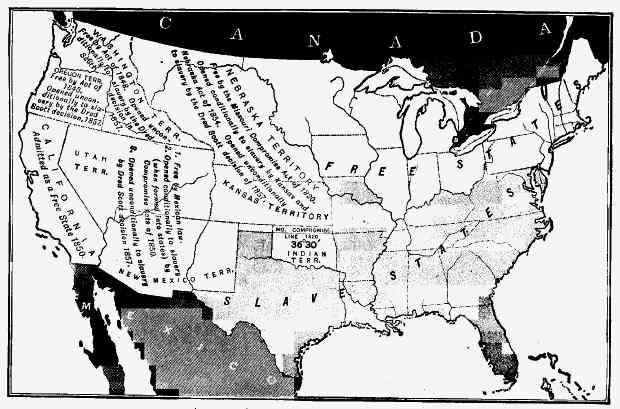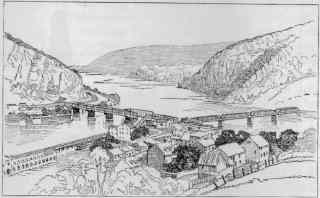
NEGenWeb Project
Resource Center OLLibrary
268
LEADING FACTS OF AMERICAN HISTORY [1856-1857
Minnesota and Oregon (1858-1859), entered the Union without slavery (1861).
During the heated debate in Congress over the Kansas troubles, Senator Charles Sumner of Massachusetts made a speech denouncing slavery, and alluding to Senator Butler of South Carolina in a way that stung the latter's friends to madness. Representative Brooks, a kinsman of Butler's, considered the speech an insult; he brutally assaulted Sumner, and beat him so severely over the head with a heavy cane that he was obliged to give up his seat in Congress for nearly four years. In less than a year from his return (1859) South Carolina seceded from the Union.
309. Summary. The chief events of Pierce's administration were: (1) the "World's Fair" exhibition; (2) Commodore Perry's treaty with Japan, opening that country to trade with the United States; (3) the passage of the Kansas-Nebraska Bill, repealing the Missouri Compromise; (4) the foundation of the modern Republican party; and (5) the struggle of the North and the South for the possession of Kansas.
JAMES BUCHANAN (DEMOCRAT) 310. Buchanan's Administration (Fifteenth President, One Term, 1857-1861); the Case of Dred Scott. Two days after President Buchanan's1 inauguration Chief Justice Taney gave the decision of the United States Supreme Court in a case of great importance, known as the "Dred Scott Case." Scott was a negro, slave and the son of slave parents. His master had taken him (1834) from the slave state of Missouri to the free state of Illinois, where he stayed two years. He then took him to what is now Minnesota, a part of the country in which Congress had prohibited slavery by the Missouri Compromise (§§ 243, 305). Finally, he carried Scott back to Missouri.
1 James Buchanan was born in Pennsylvania, 1791; died, 1868. He was elected to Congress in 1820; later, to the United States Senate; was minister to Russia; Secretary of State under Polk; and in 1853 minister to England. He was elected President (John C. Breckenridge of Kentucky, Vice President) by the Democrats, over John C. Frémont, the Republican candidate, and Millard Fillmore, the American, or "Know Nothing," candidate.
1857]
DECISION IN THE DRED SCOTT CASE 269
There he sold him to a new master; but the negro demanded his liberty on the ground that since he had lived for a considerable time on free soil he had therefore become a free man.
311. Decision of the United States Supreme Court in the Dred Scott Case, 1857; Results at the North. The case was carried to the United States Supreme Court. In 1857 that court1 decided:
1. That a negro (whether bond or free), who was a descendant of slave ancestors, was not an American citizen.
2. That therefore he could not sue (even for his liberty) in the United States courts.
3. It furthermore decided that Scott had not gained his freedom by going into a free state, or into a territory where Congress had prohibited slavery by the Missouri Compromise (§§ 243, 305), since Congress had no rightful power to make such a law. (Map, p. 270.)
Chief justice Taney had shown himself a friend to the black man, for he had voluntarily freed his own slaves. But when he gave the decision of the court he took occasion to say that when the Constitution was adopted negroes "had no rights which the white man was bound to respect." Finally, he declared that Scott's master could lawfully take his slaves into any territory, just as he could his horses and his cattle.
This decision by the highest court in the United States stirred the North like an electric shock. The people of that section believed that it practically threw open to slavery not only the territories but even the free states.2 The result was that many people determined that the law should not be carried out.3 This, of course, angered the South, and greatly increased the bad feeling between the two sections.
312. The Business Panic (1857). While men were excitedly discussing the Dred Scott decision, and while the danger of disunion was growing more and more threatening, a heavy business failure
1Judge McLean and Judge Curtis did not agree with the other seven judges.
2 That is, that the free states could not prevent a slaveholder from bringing his slaves with him (as Scott's master had done), and staying at least two years with them on free soil.
3 The Northern people believed that under the Constitution slaves could only be held in those states which protected slavery by their laws, and that if a master took his negroes into a state whose laws forbade slavery, he could not hold them in bondage there.

AREA OF FREEDOM AND SLAVERY IN 1857
Congress abolished slavery in the District of Columbia, April 16, 1862, and prohibited it in the territories, June 19, 1862.
1857-1859]
SILVER, PETROLEUM, AND NATURAL GAS 271
occurred in Cincinnati. This brought down other business houses, just as when a large building falls the smaller ones whose walls rest against it often fall with it. The panic of 1837 (§ 275) was now
repeated. Nearly all the banks in the country failed, many railways could not pay their debts, thousands of merchants and manufacturers were ruined, and it seemed at one time as though the rich must become poor, and the poor must become beggars.
The chief causes of this trouble were to be found in the results of the discovery of gold in California (§ 295). The wealth which poured in from the mines had stimulated men to overdo all kinds of business, more lines of railway had been built in the West than the population demanded, many manufacturers had made greater quantities of goods than they could sell, and many merchants had bought more than they could pay for. The country was like a man who had worked beyond his strength -- it had to stop and take a rest.
313. Discovery of Silver in Nevada and Colorado, and of Petroleum and Natural Gas in Pennsylvania. But less than two years after the panic some of the richest silver mines ever discovered on the globe were found in the mountain region of western Nevada (1859). The two chief of these, known as the "Bonanza" mines, sent our many millions of dollars' worth of ore cast in the form of "silver bricks." When, in the course of time, the Bonanza mines were practically worked out, new mines were found (1877) in Leadville and other parts of Colorado and in Utah, which sent out a fresh supply of the precious metal.
The same year (1859) E. L. Drake bored the first successful oil well on Oil Creek, near Titusville, in northwestern Pennsylvania. Since then petroleum has flowed, or is pumped, from the
272
LEADING FACTS OF AMERICAN HISTORY [1859-
wells opened in Pennsylvania, Ohio, Indiana, Texas, southern New York, and the Far West. The average yield of these wells has often been more than a hundred thousand barrels of oil a day. Lines of iron pipes, laid underground, now carry the oil over hills, across rivers, through forests and farms, to Chicago, Buffalo, Philadelphia, New York, Baltimore, and other points on the Great Lakes, the seacoast, and elsewhere. The largest stream of oil has a total length (including main pipe lines and "feeders") of not far from 75,000 miles; it is about eighteen times the length of the Mississippi-Missouri, the longest river in America or in the world.

HARPERS FERRY IN 1859
The Standard Oil Company of Cleveland, Ohio, secured practical control of the chief part of the business (1877). Petroleum is used not only for giving light, but for heating purposes and for driving motor cars and machinery.
About fifteen years after the discovery of petroleum in Pennsylvania natural gas was found issuing from the rocks in the same region, and later in Ohio, Indiana, and other parts of the West. This gas, which is largely used, at one time took the place of oil and coal in Pittsburg, Indianapolis, and vicinity, for lighting streets and houses, for cooking, and for fuel in manufacturing.
1859-1860]
THE ELECTION OF ABRAHAM LINCOLN 273
314. John Brown's Raid. But while the excitement over the discovery of petroleum was spreading, and men were getting rich by "striking oil," a strange event startled the whole country. "John Brown of Osawatomie" (§ 308) made a raid into Virginia, seized the government buildings at Harpers Ferry, and attempted to liberate the slaves in that vicinity (October 17, 1859). John Brown's whole band consisted of only about twenty men, partly whites and partly negroes. After hard fighting he was captured, with six of his companions, and hanged at Charlestown, Virginia (now West Virginia) (December 2, 1859). On the day of his execution he handed this paper to one of his guards: "I, John Brown, am now quite certain that the crimes of this guilty land will never be purged away but with blood. I had, as I now think, vainly flattered myself that without very much bloodshed it might be done."1
Within a year and a half from the day of his death the North and the South were at war with each other, and a Northern regiment on its way to the contest was singing,"John Brown's body lies a-moldering in the grave,
But his soul is marching on."315. The Election of Abraham Lincoln; Secession of South Carolina, 1860. In November, 1860, Abraham Lincoln2 of Illinois was elected by the Republican party President of the United
I Governor Wise of Virginia said of John Brown, "He inspired me with great trust in his integrity as a man of truth." The Governor also said: "They are mistaken who take Brown for a madman. He is a bundle of the best nerves I ever saw ... cool, collected, indomitable." In his last speech at his trial, John Brown declared that his only object had been to liberate the slaves, and that he did not intend to commit murder or treason or to destroy property. "I feel," said he, "no consciousness of guilt."
2 Abraham Lincoln was born in Hardin County, Kentucky, in 1809. His early life was spent in toil, hardship, and poverty; but it was the independent poverty of the Western wilderness, and it made men of those who fought their way out of it.
When the boy was only eight years old he had learned to swing an ax. From that time until he came of age he literally chopped and hewed his way forward and upward. He learned to read from two books -- the spelling book and the Bible; then he borrowed "Pilgrim's Progress" and AEsop's Fables, and would sit up half the night reading them "by the blaze of the logs his own ax had split."
In 1816 the Lincoln family moved to Spencer County, Indiana; and in 1830, to Decatur, Illinois. On this last occasion young Lincoln walked the entire distance, nearly two hundred miles, through mud and water, driving a four-ox team. The journey took fifteen days, for even two yoke of oxen do not move quite as fast as steam. When they reached their
 |
 |
 |
 |